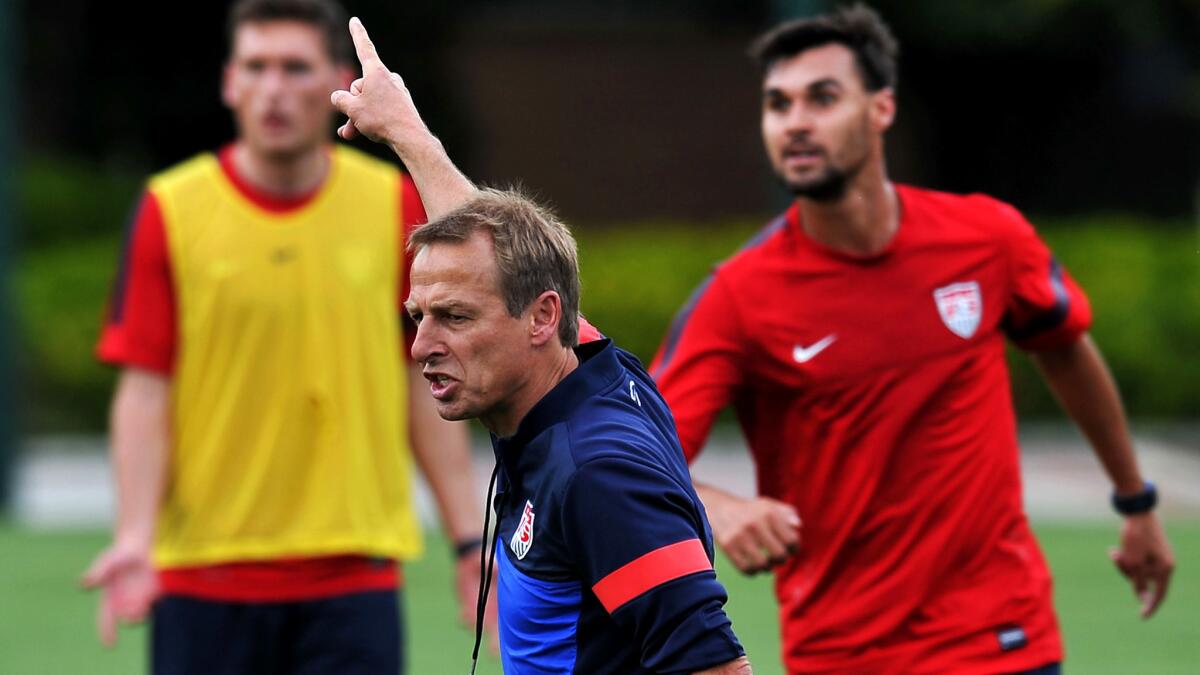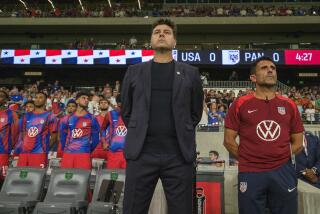Juergen Klinsmann doesn’t hold back when talking about U.S. soccer

U.S. Coach Juergen Klinsmann is still a big believer in American players challenging themselves in European leagues rather than MLS.
Juergen Klinsmann has never been known as a great tactician. But the U.S. national team coach is a pretty good motivational speaker.
Blunt, honest and direct, his words seek clarity, not compromise. They challenge rather than cajole.
So what to make of Klinsmann’s comments in a lengthy interview with the Washington Post’s Steve Goff last week?
While demanding accountability from his players, Klinsmann accepted little of that for his coaching. While criticizing the state of the game in the U.S., the national team’s technical director assumed only partial responsibility for changing it.
“The way the game is educated, told, driven, we are still far away from real soccer nations,” Klinsmann told the Post. “The biggest educational problem is people think it’s a coaches’ game in the United States. It’s not. It’s a players’ game.
“There’s too much emphasis on telling people what to do.”
Klinsmann also revisited some familiar themes: his disdain for Major League Soccer, his preference for players seared in the caldron of the European leagues and the belief that American players still have a long way to go to catch the rest of the world.
“I understand the differences between the different countries, the different pools coaches pull players from — I understand the German pool, the Dutch pool, Brazil, Argentina,” he said. “I know the limits that we have, but we need more drive to say ‘Hey, let’s figure out a different way to get the message across.’”
Those comments came just before the first of two September friendlies: Friday’s 2-1 win over Peru and Tuesday’s game with Brazil in Foxborough, Mass. And as always, the timing of Klinsmann’s remarks was as calculated as the words themselves.
Before last summer’s World Cup, Klinsmann said the Americans couldn’t win the tournament — a prediction that was both honest and oddly inspiring at the same time. His team, eager to prove the coach wrong, responded by advancing
out of the “Group of Death,” then missing the quarterfinals only because Chris Wondolowski missed an open net in a knockout-round loss to Belgium.
This year’s State of the Game address comes as the U.S. prepares for what could become a defining game of the Klinsmann era, next month’s CONCACAF Cup with Mexico at the Rose Bowl.
It also comes on the heels of the most embarrassing performance of the Klinsmann era: back-to-back losses to Jamaica and Panama in July’s Gold Cup, in which the U.S. finished outside the top three for the first time in 15 years.
But rather than embracing that disaster as motivation, Klinsmann chalked it up to poor officiating.
“We don’t want to blame anybody,” he said. “I am not blaming the referees, but I’m just telling you, the referees had a huge influence on the outcome of the Gold Cup….
“This was a Gold Cup settled by decisions that were very, very questionable.”
There again, Klinsmann’s words were both truthful and pointed. Though the U.S. team played poorly, the officiating was even more dreadful, with two egregiously bad calls helping Mexico to a title and setting up October’s CONCACAF playoff to determine the region’s representative in the 2017 Confederations Cup.
But in case anybody missed the point of his comments, Klinsmann spelled it out.
“It builds up a lot of question marks for this one-off game [with
Mexico]…. There’s a huge cloud — for both teams,” he said, a not-so-subtle warning to the referees and CONCACAF that questionable calls will be closely scrutinized.
As for the criticism aimed his way, Klinsmann says that proves more people care about U.S. soccer, even though they don’t understand it.
“It’s a good thing you have so much comments and opinions because it shows you that a lot more people care,” he told the Post.
“Do they understand really what happened in the Gold Cup? Some of them absolutely do and a lot of people don’t. I take it. It’s not a big deal. But it also explains we have a long way to go to educate people on the game of soccer still in this country.”
In the meantime, Klinsmann has his own house to get in order.
Although the Americans got two Jozy Altidore goals in the win over Peru, both were aided by fortunate bounces — the first a rebound off keeper Pedro Gallese, who stopped an Altidore penalty kick, and the second when Gyasi Zardes’ errant pass struck a Peruvian defender and landed at Altidore’s feet.
The U.S. also remains unsettled on the back line, especially in central defense. Peru’s lone goal Friday came when Daniel Chavez, given a ton of space on the edge of the penalty area, bounced a shot off center back Omar Gonzalez and over the head of keeper Brad Guzan.
And speaking of Guzan, he’s now at the center of a controversy he probably can’t win.
When Tim Howard, the U.S. record-holder in wins and appearances, took a year-long sabbatical from the national team, Guzan became the starter. But Howard is back now, so even though Guzan has played well — he made three spectacular saves to preserve the win over Peru — it might be difficult for Klinsmann to resist making a change. If Howard plays Tuesday against Brazil, it’s likely he’ll start against Mexico as well.
Either way, Klinsmann is sure to have something to say about it.
Twitter: @kbaxter11







